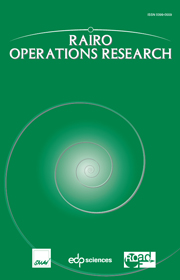No CrossRef data available.
Article contents
Autour de nouvelles notions pour l'analyse desalgorithmes d'approximation : de la structure de NPO à la structuredes instances
Published online by Cambridge University Press: 15 July 2003
Abstract
This paper is the continuation of the paper “Autour de nouvelles notions pour l'analyse desalgorithmes d'approximation: Formalisme unifié et classesd'approximation” where a new formalism for polynomialapproximation and its basic tools allowing an “absolute”(individual) evaluation the approximability properties ofNP-hard problems have been presented and discussed. Inorder to be used for exhibiting a structure for theclass NPO (the optimization problems of NP),these tools must be enriched with an “instrument” allowingcomparisons between approximability properties of differentproblems (these comparisons must be independent on any specificapproximation result of the problems concerned). This instrumentis the approximability-preserving reductions. We show how tointegrate them in the formalism presented and propose thedefinition of a new reduction unifying, under a specific point ofview a great number of existing ones. This new reduction allowsalso to widen the use of the reductions, restricted until noweither between versions of a problem, or between problems, inorder to enhance structural relations between frameworks. Theyallow, for example, to study how standard-approximation propertiesof a problem transform into differential-approximation ones (forthe same problem, or for another one). Finally, we apply theseveral concepts introduced to the study of the structure (andhardness) of the instances of a problem. This point of view seemsparticurarly fruitful for a better apprehension of the hardness ofcertain problems and of the mechanisms for the design of efficientsolutions for them.
Keywords
- Type
- Research Article
- Information
- Copyright
- © EDP Sciences, 2002


